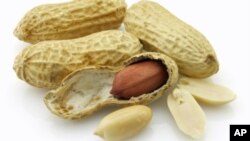To someone with a peanut allergy, accidentally ingesting a product containing even tiny amounts of the legume can trigger a potentially life-threatening reaction. But researchers have found that when patients were given miniscule daily doses of peanut powder, they were able to build tolerance to the deadly food allergen.
There is currently no allergy shot to desensitize individuals with a peanut allergy. The best treatment is to avoid all foods that might contain peanuts, which - in some people - can cause a potentially fatal reaction called anaphylaxis, in which the airways tighten and restrict breathing. The only treatment is a rescue shot of epinephrine, which opens the airways. Those with the allergy often carry an emergency shot with them.
It might seem dangerous to give these people an oral dose of peanut powder. But that’s exactly what U.S. researchers did in a new multi-center clinical trial.
Wesley Burks, chairman of the department of pediatrics at the University of North Carolina School of Medicine in Chapel Hill, led the study. He says 20 peanut-sensitive adolescents at two centers were given liquid containing miniscule amounts of peanut powder which they held under their tongue for two minutes before swallowing, while 20 received a placebo, or inactive, liquid.
Every day, according to Burks, scientists increased the amount of peanut in the liquid by a tiny fraction.
“Before the study, they only could eat a third of a peanut. At the end of the study they could tolerate three peanuts. So that difference changed. What we don’t know is how long do you need to continue the therapy and then you need to stop it so that change is permanent," he said.
More studies will be conducted to find that out. The SLIT trial, which stands for Sub-Lingual or beneath-the-tongue Immuno-Therapy, shows promise in desensitizing people with severe peanut allergies; after 44 weeks, adolescents in the study could tolerate ten times as much peanut as before the trial, compared to subjects who received an inactive liquid, according to Burks.
The researcher cautions those with peanut allergies not to try desensitizing themselves. Microdoses measured in just billionths of a gram of peanut power were used in the trial, doses that could not be replicated at home.
"We were unbelievably safe in trying to administer the product. And it is not something that's ready for practice or ready for home use, because for peanut-allergic patients, there's too many dangers in doing that," he said.
The study on treating peanut allergy with sublingual therapy is published in the Journal of Allergy and Clinical Immunology.




